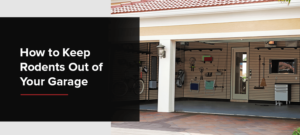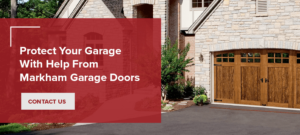How to Keep Rodents Out of Your Garage

Garages are a tremendous asset for our homes — they keep our vehicles safe, offer storage space and can be used as recreational rooms or workshops. However, since most homeowners will leave items in the garage unattended for long periods, it’s common for pests such as insects and rodents to make themselves at home. Mice, in particular, might see your garage as an excellent source of shelter, food and water.
If not stopped, pests can destroy your belongings and the structural integrity of your garage. Learn the reasons mice or rats might be targeting your home and how to prevent rats in your garage.
Why Mice Choose Garages
According to a 2019 American Housing Survey (AHS), 37% of Americans have seen rodents in their homes, with 39% finding them in their garage. Rodents are among the most dangerous garage pests because they can spread over 35 diseases, chew and burrow into your belongings and seldom arrive alone.
Chances are, you’ve encountered a rodent or insect in your garage at some point. But have you ever wondered why they seem to love garages so much? A few reasons include:
- Garages provide protection: Many homeowners struggle to keep bugs out of their garages and find it difficult to deter rodents from their homes throughout the seasons. This is often because garages protect pests from the warmth of the summer and the frigid cold of the winter. They might also seek your garage to hide from predators or if their outdoor home has been destroyed.
- Garages simulate a pest’s natural environment: Most bugs and mice are drawn to garages because they’re reminiscent of their natural habitats — dark and warm with bountiful materials and debris to burrow and nest in.
- Pests are attracted to smells: Your garage can be a source of tempting smells that may attract rats and insects, such as garbage or plants.
- Garages provide a food source: Mice will eat most grain-based food, such as dog food or bird seed, which is commonly stored in garages.
- Garages offer various hiding places: Mice prefer small, protected spaces that aren’t too damp so they can hide or nest. They may take up residence in storage boxes, walls or car engines.
5 Steps to Keep Rodents Out
Many homeowners struggle with mice infestations, especially when their homes reside next to empty fields, lots or unoccupied buildings. Fortunately, there are several ways to deter mice from your garage and protect your home and belongings.
If you’re struggling with a garage mice infestation or want to be proactive, consider the following precautions:
1. Maintain an Organized Space
Since rodents tend to take residence in your garage when you leave it unattended, it’s an excellent idea to sweep the area every few weeks. By storing items off the ground and staying as organized as possible, you can rid your garage of the dark, tiny places mice love to burrow and nest in. If you use your garage primarily for storage, regularly checking in and keeping the space clean and tidy can prevent mice from using it to hide and nest.
2. Seal Access Holes
Most mice can fit through a hole just a quarter of an inch in diameter. It’s essential to seal any access holes, cracks or crevices in your garage’s ceiling, floor and wall materials to prevent pests from invading your space.
Follow these steps to rat-proof your garage:
- Install weather stripping to prevent entryway through doors and windows.
- Use silicone-based caulk to seal cracks, holes and crevices within your garage walls, windows, doors, foundation and roofing.
- Apply masonry sealer to large openings in stone, concrete or brick.
- Block holes in window screens with a screen repair kit — they’re available at most home supply stores.
- Place vent covers over access points to your plumbing and heating, ventilation and air conditioning (HVAC) system, like dryer vents or duct openings.
3. Eliminate Desirable Resources
One of the most significant ways to deter rodents from your garage is by making the space inhospitable. To eliminate their most desirable resources, you’ll want to:
- Lock up food: Remove food attractions by using covered trash containers and cleaning your cooking grills regularly. If possible, try to keep food waste out of your garage until trash pickup day.
- Use plastic storage containers: Use plastic containers with tight-fitted lids to store decorations, food and other goods rather than cardboard boxes. This way, rats can’t hide or make nests out of the material.
- Trim nearby trees or shrubs: Prevent rodents from getting close to your garage by eliminating nearby hiding spots. Trim any trees or shrubs close to your garage that may provide them cover.
4. Place Traps
If you find potential problem areas or access points, laying traps can help you get rid of mice in your garage and prevent them from returning. Remember to keep children and pets away from your garage if you use toxic or spring-loaded traps. Release rodents at least a mile from your home to keep them from coming back.
A few vulnerable spots to place pesticides, sprays or traps can include:
- Interior and exterior walls
- Windows
- Doors
- Roof eaves
5. Fortify Your Garage Door
While many rodent infestations occur through cracks or crevices, other mice simply enter through the garage door. To ensure your garage isn’t vulnerable to rodents, follow these necessary steps to fortify it:
- Apply weatherstrip: Many mice might chew through the weatherstripping to get into your garage. Ensure your garage doors and windows are adequately sealed and apply new weatherstripping in these areas if needed.
- Ensure your door closes completely: Make sure your garage door closes without any gaps and responds to your controls. Promptly call professionals to make necessary repairs to your garage door, remote or operating system.
- Consider replacing your garage door: If your garage door is particularly old or damaged, you may want to consider replacing it. A new door can protect you from rodents and keep your home safe while saving you money on pest control and energy costs.
- Keep up with garage door maintenance: It’s a great idea to regularly clean debris from your garage door to prevent buildup and damage. Professionals can also perform a routine maintenance check to ensure your garage door is running smoothly and protected from pest invasion.
Protect Your Garage With Help From Markham Garage Doors
While there are many ways rodents can enter a garage, there are also several steps you can take to protect your home and belongings. Sealing entryways and maintaining your garage door can significantly deter mice or rats. It’s also crucial to contact a professional door servicing company when you’re concerned about your garage door.
Markham Garage Doors can provide routine maintenance, such as sealing and weatherstripping, while also taking care of serious problems to prevent rodents from invading your garage. We offer same-day services and quality repairs for your needs.
To schedule garage door services, contact us today!


